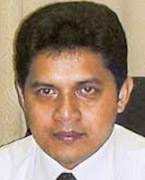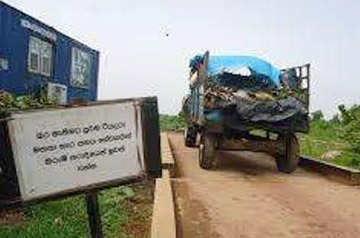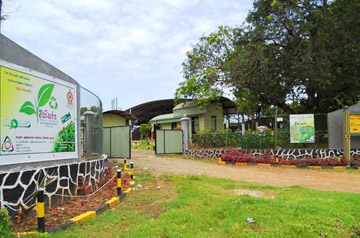Mega composting facilities to manage WP garbage
By Ranil Wijayapala
The rapid development taking place in almost all parts of the country
has turned many urban settlements in the country into more beautiful and
attractive places. Clean water bodies, streets and public recreational
areas have added beauty to the cities enabling the people to breathe
fresh air and live in a relaxed environment. These changes have made a
great impact on the people who are living in the Western Province.
 |
| Nalin
Mannaperuma |
However, the heaps of garbage generated in urban settlement has
become a major issue to be handled by the Local Authorities as most of
the Local Authorities lack proper mechanisms to handle the
ever-increasing Municipal Solid Waste on their own due to lack of lands
that are to be used as dumping sites and other infrastructure facilities
with them.
The delay in implementing proposed mega waste management projects
such as waste to energy projects and other projects for handling of MSW,
may be due to public protests, lack of political will in implementing
those projects in the face of public protests and protracted litigation
over the dumping sites, have made the waste management more difficult
and challenging for the local authorities.
Situation
The Western Provincial Council which is home to nearly one third of
the country's population is facing a huge challenge in waste management
at present as it is responsible for the generation of nearly two third
of the total solid waste generation in the entire country.
Having understood this situation the Western Provincial Council,
parallel with the national level policies and strategies of Mahinda
Chinthana policy which proposed that the waste management approach
should be based on fundamentals of preventing, reducing, reusing,
recycling and eco-friendly dispose of waste, has embarked on various
projects to handle the waste generated in the province.
 |
| Accepting
sorted garbage at Karadiyana site |
 |
| The composting
facility at Pohorawatta, Kalutara |
It was on the directive of the Western Province Chief Minister
Prasanna Ranatunga, the Waste Management Authority established solely
for the effective handling of waste generated in the province is
implementing projects and programs targeting to achieve short, medium
and long term goals in terms of waste management in the province.
According to Director Solid Waste Management Authority of the Western
Province Nalin Mannaperuma, the Western Province contributes 60 percent
of the total waste generation of the country, generating around 3,500
metric tons of MSW per day. However, this is only the MSW collected
daily by the Local Authorities and that amount of garbage can be doubled
when considering the other industrial waste, building demolishing waste
daily generated in the province.
"Studies reveal that this amount will be doubled by 2050 as waste
generation rate is increased by 1.2 percent in every year with the
increasing population and also due to rapid urbanisation. Therefore the
waste management will be a challenge in the future if there is no proper
waste management system in place", Mannaperuma said.
That is why the national level waste management policy clearly states
that we have to practise Waste Reduction, Reuse and Recycle as a means
of handling effective waste management in the country.
Contributor
To adopt this national policy in handling the MSW, the Western
Province the biggest contributor for the country's waste generation has
adopted the strategy of using waste as a resource.
"To facilitate the implementation of the national level 3R policy in
waste management we try to inculcate waste management disciplines among
general public to reduce waste at the generation by way of promoting
waste separation at generation", Mannaperuma said.
In this endeavour composting has become the most effective and
efficient method for the WMA considering the nature of the MSW collected
daily by the Local Authorities.
"Composting is the best way of using MSW as a resource as 30 per cent
of the garbage collected by the Local Government Bodies in Sri Lanka
consist of short term bio-degradable waste which can be easily converted
in to compost", Mannaperuma said.
Unlike the polar region the tropical region is having very conducive
environment for composting. Since Sri Lanka is a tropical country the
environmental condition is very positive for the composting of Municipal
Solid Waste.
As Sri Lankan soil has less than one percent of organic compound
there is no retention capacity in this soil despite adding inorganic
fertiliser for agricultural purposes.
"Therefore, we have to enrich the soil with organic compounds. There
is a huge potential for production and since there is a huge demand for
the organic fertiliser we can match these two by producing compost from
the MSW", he said.
Considering this situation the Western Province has set a target to
convert 38 percent of the total perishable waste into compost by 2018.
Garbage
"That means in the year 2018 we are trying to use minimum 500 metric
tons of perishable garbage as raw material for composting in the Western
Province. Out of that we can produce around 145 MT of MSW compost per
day in 2018. To achieve that target in 2018 we will be able to generate
3600 MT of Municipal Solid Waste compost per month", he said.
To achieve this target the WMA has set a proper plan to scale up the
present composting program.
"At present when we consider the entire Western province the
composting capacity has been developed upto around 400 metric tons of
composting of perishable waste under this program. So that means at
present we have the capacity to produce 56 metric tons of compost per
day", he said.
The Western Province Waste Management Authority and the Local
Government Authorities are directly involved in this process as
respective Local Authorities are producing composting in their
respective areas while the WMA is engaged in mass scale composting
plants.
Dump
Western Province Waste Management Authority has two mass scale
composting facilities in Pohorawatta in Kalutara which have been
initiated at the national level Pilisaru project and handed over to the
WMA for the maintenance and operations.
"The entire capacity of the Pohorawatta facility is around 30 MT of
perishable waste per day. We produce good quality MSW compost and we
market that product under the brand name Mihisaru", Mannaperuma said.
The second mega scale composting facility was recently commenced its
operations at Karadiyana and it has the capacity to turn 50 Metric Tons
of perishable waste into compost per day.
"There is a huge advantage of having such facility at Karadiyana
because the Karadiyana dumping site daily accepting around 500 MTs of
MSW and placed at the open dump. We try to control environmental hazards
but it is very difficult. Therefore having this composting project we
are diverting 50 MTs of MSW into compost per day", he said.
Seven Local Government bodies; Moratuwa Municipal Council, Kesbewa
Urban Council, Boralesgamuwa Pradeshiya Sabha, Jayawardhanapura Kotte
Municipal Council, Dehiwala Mount Lavinia Municipal Council, Homagama
Pradeshiya Sabha and Maharagama Urban Council are benefitting from this
facility.
"We have instructed the local authorities to improve source
segregation as much as possible and bring only the segregated waste to
the dumping facility.
"If the garbage has to be sorted at the facility itself the
production cost of the compost will be increased by 60 percent. garbage
into the dumping site", he said.
"We wanted to avoid that situation and we are accepting only the
sorted garbage at the facility", he said. I am happy to say that out of
the all these Local Authorities, Moratuwa and Sri Jayawardhanapura,
Kotte Municipal Councils have made a remarkable effort to dump sorted
garbage to the Karadiyana site", he said.
Today Moratuwa MC is sending around 30 MT of MSW per day to the
Karadiyana site per day. Sri Jayawardhapnapura Kotte MC is sending
around 5 MTs of sorted MSW per day.
Discipline
These two Municipal Councils have improved the waste sorting
discipline in their Municipal Council areas with a lot of difficulties
despite the resistance they face from the general public during this
process. But they have overcome all these resistance and improved the
sorting of garbage at generation.
With the promoting of sorting of garbage among the general public the
Local Authorities also benefit as they can generate recyclable waste
also into a certain extent.
"Because of the sorting of garbage people also understand the value
of the non-perishable waste. The people who are coming to pick
non-perishable waste can easily collect those material form the houses
itself enabling the households to earn an income from the non
-perishable waste. By that way informal sector has been activated to
collect the non-perishable waste at the generation", he said.
"Due to the support extended by these Local Authorities we have
reached the maximum capacity of composting at Karadiyana facility and we
are producing 50 Metric tons of compost per day from the facility at
present", Mannaperuma said.
Western Provincial Council has spent around Rs.130 million to
establish this facility and the benefit of this entire expenditure goes
mainly for the general public who are mainly living in the Colombo
district.
With the starting of the Karadiyana composting facility we have to
produce 350 MTs of compost from Pohorawatta and Karadiyana facilities
and distribute our Mihisaru products in the country. "To do this we have
identified some agents to represent different agricultural districts
through these agents and Mihisaru product go for small hold tea
plantations, rubber and cinnamon plantations in the country since there
is a big demand for compost from these sectors", he said.
Compost
Apart from distributing the Mihisaru product the WMA is also
responsible for improving and maintaining the quality of the compost
produced at Karadiyana and Pohorawatta facilities.
"Every three months we are getting an analytical report about the
quality of the product ingredients of the composting that is Nitrogen,
Phosperous, Potassium about the basic nutrients. Apart from that we are
getting a report on the content of the humidity, the contaminations of
the harmful micro-organisms into the compost. All these efforts are
aimed at distributing a quality composting for the customers", he said.
Waste Management Authority is closely working with the Centre for
Sustainability at the University of Jaywardenapura which is monitoring
pollution of the Karadiyana site.
"We are getting information frequently from them about the pollution
of environment and we are trying our best to minimise the pollution of
surrounding environment. Actually we are satisfied with our system but
in the future we have to totally eradicate contamination of the
environment form this site", Mannaperuma said.
"Every year we are planning to expand our facilities. Right now we
have 21 medium scale composting facilities and in the year 2015 we are
going to have another two medium scale composting facilities by Local
Authorities.
Then we will be able to achieve our targets to a certain extent
within our limitations and manage the waste generation in the province
until we get mega waste management facilities such as waste to energy
projects to handle major portion of MSW generated in the country", he
said.
"It was due to the guidance and leadership of Chief Minister Prasanna
Ranathunga and Chairman of the Waste Management Authority Asela Perera
we are achieving our targets in a step by step process", he said. |

